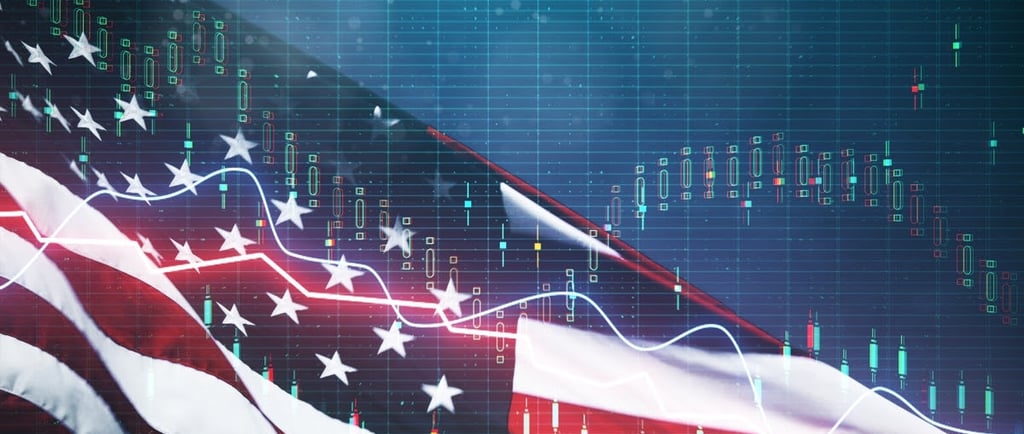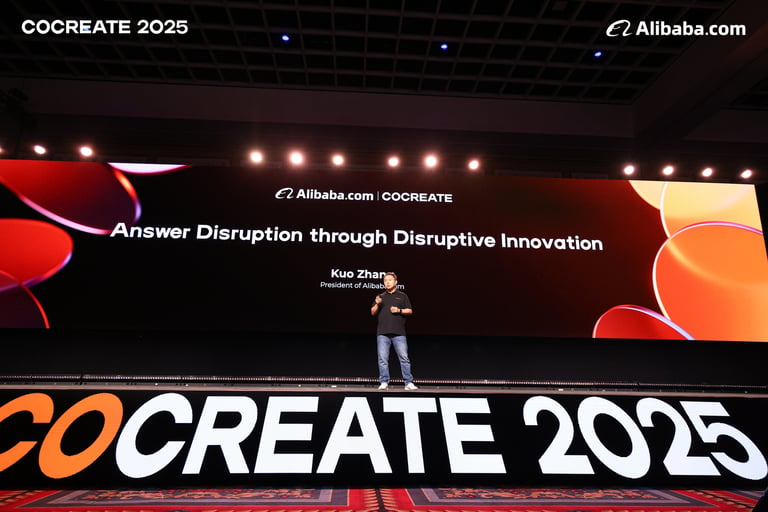BND Scope: Issue 10 – A Wave of Investments into the U.S.
The Fed’s independence is under scrutiny, Moody’s economists are sounding alarms over recession risks, and investors are entering September with caution. At the same time, huge investments are flowing into the U.S. — from South Korea and Japan to Amgen and Intel. Major corporate headlines include Goldman Sachs–T. Rowe Price’s partnership, Kraft Heinz’s split into two companies, and OpenAI’s $10.3 billion funding round.
BND SCOPE
9/6/20255 min read


The U.S. agenda was packed again this week. Debates over the Fed’s independence and Trump’s moves reverberated through the global economy, while recession warnings from Moody’s raised eyebrows. Yet consumers kept spending, and companies stood out with massive investments and restructuring moves. Meanwhile, we also followed CoCreate 2025 on the ground: Alibaba President Kuo Zhang’s remarks on how AI is rewriting the rules of global trade delivered one of the event’s strongest messages.
All eyes in Washington are once again on the Fed. Speaking at Jackson Hole, Jerome Powell highlighted rising risks in the labor market, prompting major banks to quickly shift their expectations toward a September rate cut. Markets are already pricing in that possibility.
But the real turning point came with President Trump’s attempt to remove Fed Governor Lisa Cook, citing an old mortgage application. Cook rejected the move as unlawful and turned to the courts. The case could reach the Supreme Court and directly raise questions about the Fed’s independence.
Trump has made it clear that he intends to secure a “majority” on the Fed’s board soon, which would allow him to push for rapid rate cuts. This has intensified the political pressure on Powell to unprecedented levels.
The developments are not only being followed in the U.S. but also in Europe. ECB President Christine Lagarde described Trump’s actions as a “serious danger” for the global economy. Investors, too, are uneasy: Goldman Sachs has suggested that if the Fed’s independence is undermined, gold prices could soar to as high as $5,000 an ounce.
In short, the Fed is now in the spotlight not just for its policy decisions, but for its institutional independence.
U.S. Economy: Spending Holds Up, But Risks Mount
The Fed Agenda Goes Beyond U.S. Borders
The outlook for the U.S. economy is increasingly complex. Mark Zandi, Chief Economist at Moody’s Analytics, warns that one-third of the economy is already in recession or at high risk, another third is stagnating, and only the remaining portion is still expanding. New York and California’s performance will be decisive: if they weaken, a nationwide recession could become unavoidable.
Still, consumer spending remains resilient. In July, expenditures rose 0.5% month-over-month. Despite inflationary pressures, demand for cars, furniture, and durable goods stayed strong. Campaigns such as Amazon Prime Day and stock market gains further boosted the numbers. Rising incomes are helping to sustain consumer appetite — at least for now.
But Zandi warns that this resilience may not last. Job postings are declining, and payroll growth has slowed to just 35,000 per month. More worryingly, over half of industries have already started cutting jobs, a typical pattern seen ahead of recessions.
The bottom line: Consumers are still spending today, but if tariffs, inflation pressures, and rising job losses converge, the U.S. economy could face a sharp slowdown before year-end.
Investors Step Into September With Caution
Volatility has marked recent days on Wall Street. Powell’s warning about labor market weakness has bolstered expectations for a September rate cut, though it’s far from certain. For now, markets are watching Nvidia’s earnings closely. With the company making up roughly 8% of the S&P 500, its results are seen as a litmus test for the broader market.
Still, the week began on a negative note. The S&P 500, Nasdaq, and Dow all declined, with consumer staples and healthcare stocks leading losses. Treasury yields neared the 5% threshold, adding pressure to equities, while gold surged to a record $3,600 per ounce.
Trump’s growing influence over the Fed remains another source of uncertainty. Investors, however, appear confident that legal and institutional guardrails will prevent a major disruption — a stance experts warn could underestimate long-term risks to financial stability.
Adding to the sensitivity is the seasonal weakness of September, historically a difficult month for stocks. Market attention is now firmly on this week’s jobs report, which could prove decisive.
Massive investment pledges toward the U.S. continue, though the process is as political as it is economic. South Korea has announced a $350 billion package, but only within a “non-binding” framework with Washington. Key questions — such as sector allocations and profit-sharing — remain unresolved.
A similar story is playing out with Japan. Tokyo has pledged $550 billion for U.S. investments, with semiconductors and pharmaceuticals expected to be priorities. Yet the deal’s binding nature is unclear. While the Trump administration insists on using the funds at its discretion, Japan stresses that the investments must also benefit its own economy.
Alongside these state-level pledges, private corporations are also stepping up. Amgen announced a $600 million R&D facility at its California headquarters. The site will not include manufacturing, but it will provide hundreds of scientists with advanced tools to develop next-generation drugs. Amgen has already invested billions in Ohio and North Carolina in recent years. The Trump administration’s tariff threats on pharmaceutical imports are pushing such reshoring efforts further.
In short, both nations and corporations are channeling significant resources into the U.S. But these investments are as much about political leverage as they are about economic opportunity. Washington’s “bring production home” strategy is moving forward, though many uncertainties remain in the details.
At BND Consulting, we’re here to support your investment decisions with insight, clarity, and strategy. Reach out to us any time—we’re ready when you are.
Investment & Trade: Big Packages, Big Promises
In short...
The corporate front has been no less eventful, marked by major deals and restructurings.
Goldman Sachs announced up to $1 billion investment in T. Rowe Price, aiming to broaden access to private markets for retail and retirement investors.
Hitachi Energy unveiled over $1 billion in U.S. investments to expand grid infrastructure, including a new Virginia facility to produce large power transformers critical for AI data centers and industrial demand.
Intel restructured its CHIPS Act deal, securing $5.7 billion earlier than planned. With the U.S. government taking up to a 9.9% stake, the move highlights Washington’s direct involvement in tech giants.
The U.S. corporate bond market saw record activity, with companies raising over $40 billion in a single day. Firms like Merck, Cigna, Ford, and Toyota rushed to lock in favorable financing ahead of potential rate cuts.
Kraft Heinz announced a surprise restructuring, splitting into two publicly traded companies: Global Taste Elevation Co. (home to Heinz, Philadelphia, and Kraft Mac & Cheese) and North American Grocery Co. (home to Oscar Mayer, Kraft Singles, and Lunchables).
In the startup world, massive fundraising rounds made headlines:
OpenAI expanded its secondary share sale to $10.3 billion (valued at $500 billion).
Quantinuum raised $600 million (valued at $10 billion).
BETA Technologies secured $300 million from GE Aerospace.
Numerous AI, fintech, and biotech startups closed deals worth hundreds of millions.
Private equity giant Carlyle Group raised $20 billion for its AlpInvest secondaries fund, underscoring the growing importance of this market.

Corporates & Investments: Big Moves, Bold Shifts
While the U.S. economy wrestles with short-term uncertainties, long-term investments and technological transformation show no signs of slowing down. From the Fed to corporations, from consumers to global trade, everyone is preparing for new dynamics. At BND Consulting, we’ll continue to closely track this transformation and provide insights that add value to your decisions.
BND Insider: CoCreate 2025 - The New Face of Global Trade
This week, we at BND Consulting closely followed CoCreate 2025, hosted by Alibaba.com. Bringing together leading manufacturers, entrepreneurs, and investors from around the world, the event highlighted striking messages about how AI is transforming global trade.
Alibaba President Kuo Zhang emphasized in his keynote that AI is no longer a trend but a wave rewriting the very rules of global trade. According to Zhang, the era of the “micro-multinational” has begun: with AI-powered tools, even a two-person startup can reach customers in 20 countries overnight. He also noted that Alibaba’s AI agent Accio already automates 70% of buyers’ traditionally manual workflows.
Another standout speaker was Shark Tank star Lori Greiner, who shared her success story and stressed that the most critical factor in her investments has always been putting human needs at the center.
Beyond the keynotes, CoCreate 2025 functioned as a true global laboratory for business, with hundreds of networking sessions, $1 million in pitch competitions, and over 20,000 free product samples.


Consulting
Join
info@bnd.consulting
+1 (832) 270-5239
© 2024. All rights reserved.

800 Bonaventure Way Ste 116 Sugar Land TX 77479
